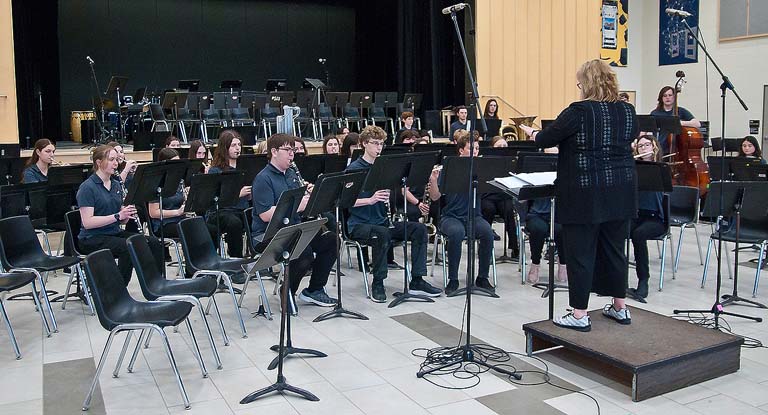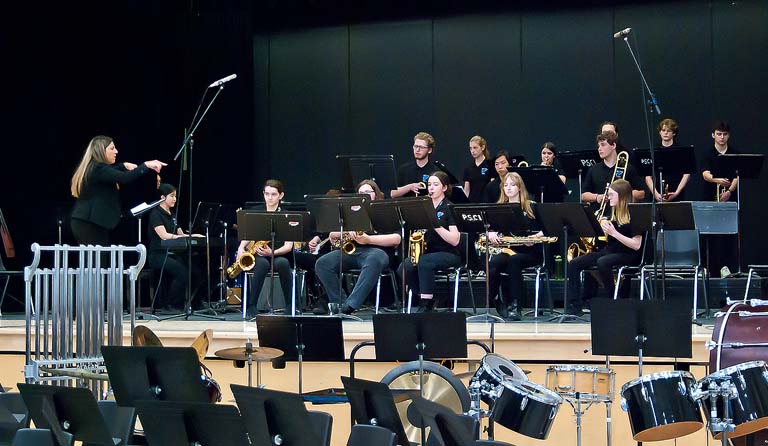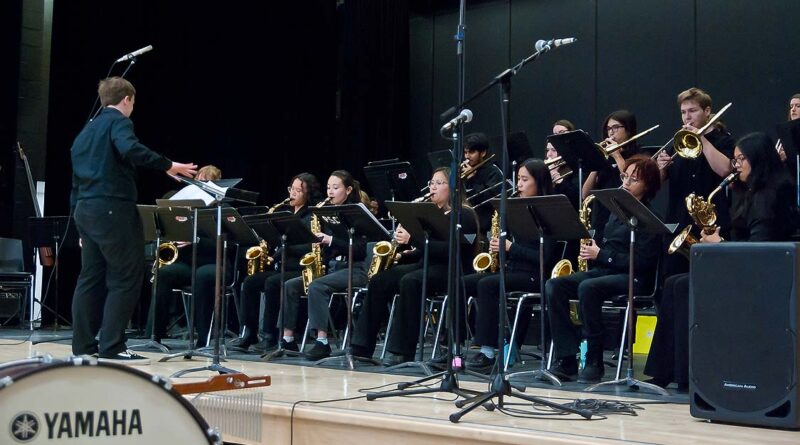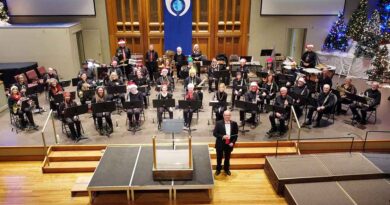The Kids Are Alright
By John Swartz
Orillia Secondary School held its second annual Sunshine City School Music Festival a couple weeks ago and reflecting on it illuminated some positive things about music programs in schools that were absent when this writer was in the school band decades ago.
I previously mentioned school bands in Ontario were not very good compared to what was experienced with American high school bands, but that has changed. The music students are playing is more difficult; gone are easy marches and easy, insipid knock-offs of pop tunes, replaced with good quality, challenging arrangements and they are better played.
Orillia was one of those islands where school bands were better than most back in the day when you had teachers like Stan Passfield, Suds Sutherland and Ross Arnold who had exceptional enthusiasm and teaching skills, standing out in the crowd. I can recall squeaks and blurts passing for music in not just the bands at the schools I went to, but many others as well.
There are some factors that defy budget cuts and it’s the teachers who manage to get their students creating despite the lack of support by the province and their local boards and administrations. It appears the teachers are better. Many schools have more music teachers, and they have also learned to recruit people from the community with music skills to help teach the bands, many of which operate outside the curriculum as extra activities.
Arnold was on hand and helping with two of our high schools. Former ODCVI music teacher Robin Watson was there to help with logistics of the festival and I’m sure still has her hand in with OSS students.
Even one of the adjudicators, Mark Caswell (there were 5 in total) is retired from teaching music at Markham District High School, a band that would compete on the first day of the festival. The judges rotated two at a time making notes and awarding points for every band competing.
Which caused a bit of surprise when Caswell, took to the stage to conduct the Markham band.

“I’m volunteering. Every Monday and I volunteer at lunch and then after school for an hour. So, they are not my kids, but,” Caswell said.
His band played big band charts, swing (which is hard to do), and snappy, syncopated timing excursions. Most interesting is he didn’t conduct. Instead he counted them in and walked to the side of the stage and let the band control their fate.
In all the years I’ve watched bands and orchestras I’ve never seen that. Most band conductors want to appear useful on stage. In the pros, Kenton, Goodman, Miller and others lead their bands in rehearsal, but often walked off to the side in performance. It takes a lot of confidence and faith for a high school music teacher to just let things happen. Markham’s band did just fine, with a good sound, good interpretation of the idioms, and they didn’t drag the tempo (or rush) as is quite common with student ensembles.
Confession, it wasn’t the first time witnessing a teacher giving up control. 90 minutes earlier I watch Guelph Collegiate Vocational Institute music teacher Dan Austin do it, so technically he was the first witnessed. Dan has been teaching at that school for 25 years and is a graduate of Twin Lakes Secondary School.
What was amazing was the confidence he displayed as he strolled to the side of the stage as his Gael Force Stage Band started to play a tune called Sleepwalk, which borrows more from Sing, Sing, Sing that the composer will probably ever admit to.

In between those two bands was OSS Hawks Jazz Band lead by Laura Lee Matthie. They opened with Nish Princess, a tune written by Brian Sarazin and Russell Lemarr based on traditional Native song and orchestrated by Christian Overton for the OSS band. It was interesting to hear it almost two months after the band premiered it. What a difference in how the tune sounded. Then the band played a tune called Salsa Caliente that just zipped along, and another Christian Overton tune called The Test .
All three tunes were rhythmic ordeals and a lot of how they got through them was because of the drumming by Oliver Sawatsky – who last year (and later in the week with different OSS band configurations) was seen playing double bass quite well. He’s been hiding his drumming talent and I think of all the OSS drummers I’ve seen over the years, he’s the best among a crop of good drummers. What I liked best was his drive and sensitivity on the jazz rides he played and his control of ‘weird’ patterns in the salsa tune.
The second day performances were taken in, in two lots. In the afternoon, Katherine Yeats lead the Twin Lakes senior concert band in a strong performance, and Jessica Kussen lead the Patrick Fogarty Catholic Secondary Competitive Concert Band. The Patrick Fogarty bands were not the greatest last year and much improved this time out.
Caswell had an explanation for the general improvement of all the bands.
“There’s pre-COVID and COVID. For music programs some of these schools it’s their second year and a lot of these schools it’s their first year. Depending on the district they are from and their school boards they were slower to even be allowed to play,” Caswell said. “For my school board it was almost two full years without playing.”
“Some of the bands are comprised of four or three grades, so you have that mentorship happening within the band. All those kids that were here last year have been working hard and are becoming mentors to the younger kids.”

In the evening both schools had different bands competing. This time however, Christina Bosco lead the Twin Lakes band and Kussen turned the conducting over to a student, Buzz March, conduct the band’s first tune, and another, Damien Daker the second tune. I don’t think I’ve ever seen a teenager conduct an ensemble in a competition, other than from my world in drum corps.
Then came the William Lyon Mackenzie Collegiate Institute Jazz Band from North York. Two tunes down, done very well, and they actually whipped out Sing, Sing, Sing played in a way some professional bands wish they could pull it off. Boy did it move. I’d be happy to lead band doing this tune so well. Heck, better to play drums along with it. And the drummer did a fantastic job keeping the song on track.
After each school’s performance one of the judges would have a short 30 minute clinic with the bands. They would work them through some passages they thought needed a boost.
“We’re listening to it for the first time. This could be their best performance or their worst. Every director hopes the best performance is at a festival. It’s like sports, you hope the best game is at the championship, but it doesn’t always happen,” Caswell said.
“When we get up to work with the band our job is to go to the areas we think could use some improvement or change. We’ll hone in on those sections. When you are out in the audience you hear them,, they do a runthrough and it’s like – wow that’s better now.”
Which was exactly my reaction to many of those mini-clinics. The thought I had was in sympathy with the music teachers, “Oh sure, now you play it like I’ve been teaching it.”
“Of course they are very attentive and responsive because of this environment, and we’re a stranger on the podium so they are sitting up and doing their best. I think that’s why you hear the change right away,” Caswell said.
“A lot of times what we’re saying are things their teachers told them. It’s almost like a parent tells them and then someone from the outside with a different voice, maybe a few different words, that’s it and they go – oh.”
“We’re trying to explain something slightly differently. It adds that extra little spice, it’s not that we’re more special than their teacher, it’s the newness.”
The advice the judges pass on is sometimes obvious stuff to work on, and sometimes digging into broader musical concepts.
“When we do the clinics we address specific points, but we try to make this clinic general, more conceptual; we might be talking about articulation at bar 150, but that can be applied to any piece of music. We have to pick a spot to highlight with a concept that remains everywhere. You know (for example), we have to know where the melody is at any time, so you don’t overplay. That’s a concept that applies to every piece of music.”
“If the kids can learn the concept, when they get the new piece of music they start to more intuitively apply them, just like professional musicians,”
Bottom line, band competitions give students a reason to learn the d#%& music and play well, therefore becoming better musicians.
In general all the schools played well last year and quite a lot better this year, which speaks to a bigger issue, better teachers than what were available decades ago. Laura Lee Matthie and Laura Christie should be applauded for starting this competition, and expanding it to almost twice as many participating schools than last year.
I get the sense there is a community of music teachers doing great things with their programs in Ontario of the kind I envied when I was a high school student. The students are more accomplished and mature musicians than at any other time I can recall.
Congrats to everyone who entertained me.
You can hear the OSS music students May 6 when they play over the dinner hours at Boston Pizza for Canada’s Music Monday and I’m sure some of the band members are involved in the annual student theatrical production, Mary Poppins this year April 23 to 25 (6:30 p.m.) and 27 (1:30 p.m.) at the school. You can get tickets at the school.
(Photos by Swartz – SUNonline/Orillia and Images Supplied) Main: Buzz March leads the Patrick Fogarty Catholic Secondary School Jazz Band




